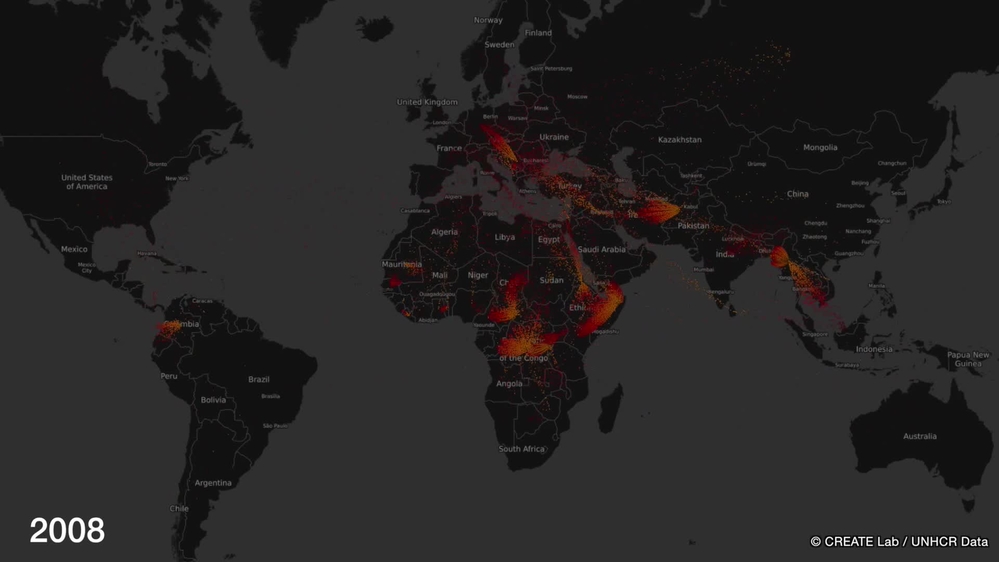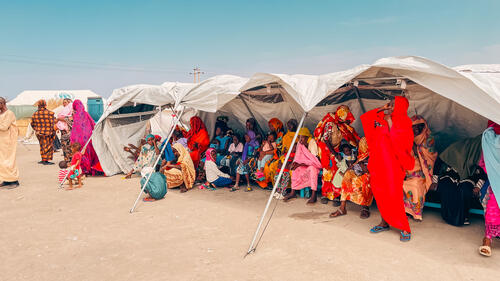Facts about IDPs and refugees as at the end of 2021Source: UNHCR Global Trends: Forced displacement in 2021
- An internally displaced person (IDP) has been forced to flee home but has remained within his or her country’s borders and so is not legally defined as a refugee.
- UNHCR estimates that of the 89.3 million people worldwide who are displaced, who were displaced at the end of 2021, nearly 60 per cent – over 53 million – are IDPs.
- There are over 27 million refugees around the world.
- There are a further 4.6 million asylum-seekers, people whose claim for refugee status has not yet been determined.
- Lower-income nations host 83 per cent of the world’s refugees.
There are many reasons for flight, including war, conflict, persecution, natural disaster, deep-set destitution and repression. We see firsthand that such upheaval represents a desperate necessity rather than a choice, and generates difficulties along the way.
With health and well-being jeopardised during exodus, the lives of the most vulnerable can be on the line. MSF teams work alongside people on the move at their points of arrival or during the treacherous journeys they undertake.
IDPs and refugees: in need of assistance and protection
A large part of our field activities are geared towards internally displaced people (IDPs) and refugees. In 2021, 17 per cent of MSF field projects assisted displaced people, and a further 23 per cent were dedicated to assisting a mix of displaced people and the general population. With the number of people who have been forcibly displaced doubling over the last decade, their health needs continue to mount, and are not always met.
Our roots were put down in the camps set up for Vietnamese, Cambodian, Laotian, Afghan and Ethiopian refugees in the late ‘70s and ‘80s. MSF has a long history of assisting and protecting people.
In 2021, number of MSF projects dedicated to assisting displaced people included
17 %
17%
23 %
23%
What do we see? How do we respond?
The public health consequences of armed conflict and the displacement of people have been well documented during the past 30 years. We see high death rates among groups of IDPs and refugees but clear priorities have been identified to curb the mortality. The provision of adequate food, clean water, sanitation, and shelter have been demonstrated to be effective interventions.
Our teams in the field conduct rapid needs assessments, establish public health programme priorities, work closely with affected communities, organise and manage health facilities and essential medical supplies, train local workers, coordinate with a complex array of relief organisations, monitor and evaluate the impact of their programmes, and efficiently manage scarce resources.
Our work with IDPs and refugees includes a wide array of services such as:
- treatment of non-communicable diseases,
- vaccination campaigns,
- mental health activities,
- surgery and trauma care,
- out-patient consultations,
- maternal health services and obstetrics,
- provision of shelter, drinking water and latrines, and more.
We also advocate for patients to have access to free or affordable healthcare.
People on the move – and unsafe passage
Migration and human mobility are part of the inter-connected world we live in and the “scope” of human migration is consequently vast. Our work with IDPs and refugees was expanded in the 1980s accordingly to include “social exclusion” in Europe and beyond - including the needs of undocumented migrants.

The movement of refugees worldwide from 2000 to 2015
A history of violence and high levels of suffering are common among those we seek to help. The routes they take can be marked with violence and abuse, criminal people-smugglers who extort and abandon their “cargo” and perilous passage across deserts and at sea.
They also face containment, detention and deportation, since population movements (whatever drives them) at times are seen as a threat, rather than inciting expressions of solidarity. Some governments fail to protect men, women and children already exposed to heightened vulnerability from further violence or deprivation. Safety is denied to those in need of refuge, blind eyes are turned to the high risks of passage, and remaining dignity and rights are crushed. The mistreatment – and sometimes violence - inflicted by authorities can take many forms, leaving individuals stripped of their basic rights and affected in their health and well-being.
Working among people on the move, we act on health-driven needs and vulnerabilities alone, regardless of any individual “label” that authorities or others accord.
What do we see?
MSF has first-hand experience of the consequences of containment, deportation and deterrence as manifested through closed borders, detention, refoulement (or forcing back), prolonged encampment, and denial of the right to seek and enjoy asylum or to earn a living. Our teams witness important levels of violence and mistreatment. This would include from gang violence in a country of origin, for example, or even from rampant persecution outside a country of origin when resident there for years and/or trapped. These people need escape, refuge, and protection as refugees.
The acute persecution of migrants subjected to detention, slavery and violence in Libya, Syrians journeying to Europe, and victims of gang violence in the Northern Triangle of Central America who aim to reach the US via Mexico are all cases in point.
How do we respond?
We firmly place ourselves in solidarity with those on the move and with those who assist them. MSF challenges the detrimental consequences of these policies and practices, fuelling the work of criminal networks, and calls for humanity to prevail in all instances, along with the provision of medico-humanitarian assistance and protection for those in need.
In our missions and projects, we pay special attention to the medical services to be provided to people on the move, whenever critical health needs are identified or when vital relief needs are denied by authorities.
During 2015 and 2016, MSF teams provided assistance at multiple points along the Balkans overland route, especially at the borders of Greece and Serbia, providing healthcare, psychological support, sanitation, food, shelter and transportation. We are, or have been present in Italy, Sweden, Belgium, and Germany. We also provide shelter, water, sanitation and essential relief items at reception centres, informal settlements and transit camps.
In one migrant camp in Italy, a quarter of respondents to a survey said there were poor hygiene conditions in the camp. In a nearby settlement, more than one in ten said there was a lack of drinking water.
I’m sleeping under the bridge with other people. I have no money and no way of communicating with my family. I’m really tired. Nobody takes care of us, nobody asks me how I’m feeling or how I’m living.Migrant living in Roja River settlement, northern Italy.
In 2022, MSF teams worldwide continue to respond to the increasing needs. In South Sudan, we provide displaced people fleeing conflict with relief items, such as tents, blankets, and hygiene kits which include soap. A surge of violence from armed groups in the Sahel – Mali, Burkina Faso and Niger – has forced thousands to leave their homes, where our teams provide them with medical care, including psychological counselling services. We provide people emerging from the dangerous Darién Gap in Panama – who are on their way north towards Mexico – with much-needed medical and mental health care.
Support centres
Our teams in France identify young people, who have usually undertaken the journey unaccompanied, and offer them support through a day centre for minors in Paris. Teams there provide respite, medical care and administrative assistance through the drop-in day centre.
MSF also ran a specialised centre in Athens, Greece, to rehabilitate survivors of torture, most of whom came across the seas seeking safety and protection in Europe.
MSF and search and rescue
We provide search and rescue capacity and medical care in the Central Mediterranean Sea on a search and rescue boat, the Geo Barents, which we have privately chartered.
MSF teams have worked in search and rescue on a number of boats in the Mediterranean since 2015, rescuing thousands of people from drowning.
Consequences of EU migration policies
In June 2016 we announced that MSF will no longer take funds from the European Union and Member States.
This is in opposition to their damaging deterrence policies and intensifying attempts to push people and their suffering away from European shores. This decision has been applied to our projects worldwide.



